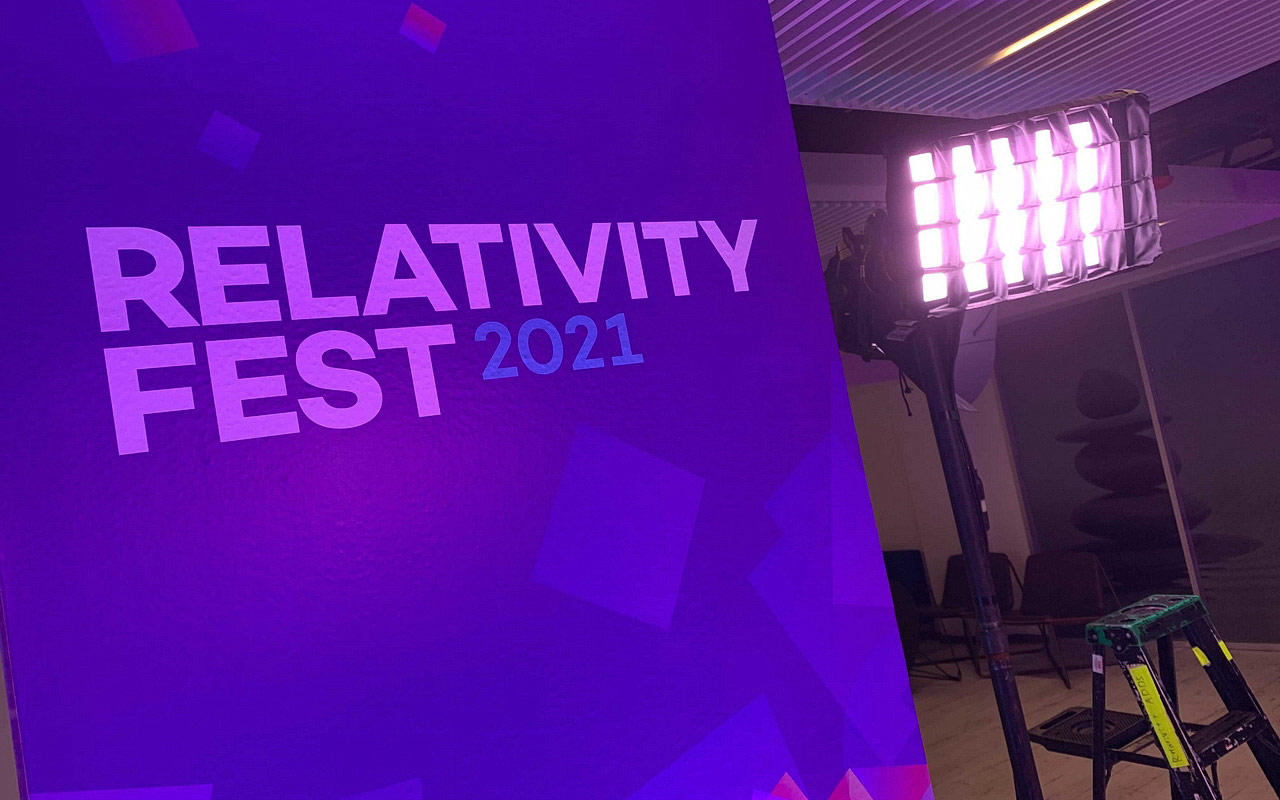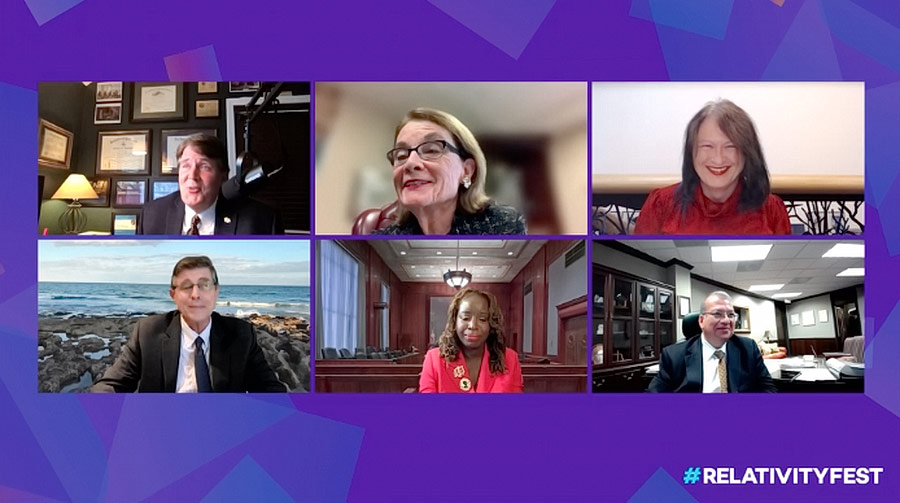
The question of what to do with data was a major theme at Relativity Fest 2021 – from how to safely gather data to the necessity for legal professionals to upskill about dealing with data.
Given that the conference was held virtually for the second year in a row, Covid-19 was top of mind for every speaker as well. Most panelists had something to say about the pandemic which has radically altered how businesses and the wider legal profession must now operate.
In the popular eighth annual Judicial Panel session, judges from across the US and the UK unpacked the results of switching to virtual court proceedings during Covid-19.
 Nora Barry Fischer, senior US District Judge of the US District Court for the Western District of Pennsylvania, said hearings conducted on Zoom were surprisingly popular with defendants.
Nora Barry Fischer, senior US District Judge of the US District Court for the Western District of Pennsylvania, said hearings conducted on Zoom were surprisingly popular with defendants.
“People often think of Zoom as impersonal, but that’s not true at all. Defendants say they enjoy seeing the judge more clearly and family and friends can also join the sessions. Also, Zoom makes it much easier for the press to attend our hearings. Judges can also make judgments available to a larger mix of people, since the public can dial in,” Fischer said.
 William Matthewman, federal magistrate judge for the US District Court for the Southern District of Florida, said the general success of virtual hearings was a “real eye opener” for him and he intends to use the technology even when the pandemic is over.
William Matthewman, federal magistrate judge for the US District Court for the Southern District of Florida, said the general success of virtual hearings was a “real eye opener” for him and he intends to use the technology even when the pandemic is over.
“It has been an excellent tool for all types of cases and proceedings. Zoom has been a silver lining to the pandemic. It has forced the legal community to adopt remote conferencing technology that lawyers probably wouldn’t have adopted otherwise. Zoom is also great for facilitating search warrants and litigation. Leading up to any trial, we’re trying to do as much on Zoom as possible,” he said.
But it’s not a completely smooth technology for the courtroom.
 Tanya Kennedy, a Supreme Court Justice of the State of New York, Civil, said an attorney or defendant will often need to ask for a question to be repeated because of the impediment of wearing a mask or the crackly nature of a poor internet connection while using Zoom.
Tanya Kennedy, a Supreme Court Justice of the State of New York, Civil, said an attorney or defendant will often need to ask for a question to be repeated because of the impediment of wearing a mask or the crackly nature of a poor internet connection while using Zoom.
“Covid-19 has taught us that flexibility and understanding are both key attributes of a well-run courtroom. Now, more than ever, it is important to consider all the circumstances. Ultimately, cooperation rules the day,” Kennedy said.
 US District Judge of the US District Court for the Western District of Texas Xavier Rodriguez agreed that the virtual hearings aren’t a perfect software tool just yet. Indeed, for some evidentiary matters, he still requires in-person court appearance.
US District Judge of the US District Court for the Western District of Texas Xavier Rodriguez agreed that the virtual hearings aren’t a perfect software tool just yet. Indeed, for some evidentiary matters, he still requires in-person court appearance.
“For example, if a recent criminal case was conducted on Zoom I wouldn’t have detected that a law enforcement officer was lying. Only when seeing his total body behavior in person did I notice the anomalies. In saying that, I’ve had witness testimony of all forms conducted on Zoom. It’s certainly caused us to rethink ways of dealing with legal matters,” he said.
 Andrew Peck, a US Magistrate Judge for the Southern District of New York, is a bit more circumspect on the use of virtual conferencing technology.
Andrew Peck, a US Magistrate Judge for the Southern District of New York, is a bit more circumspect on the use of virtual conferencing technology.
“Zoom has worked well. But I do think the next e-discovery frontier will be when people ask for access to recorded Zoom sessions. The other question for courts is if the use of Zoom will continue after the pandemic because it was only ever meant to be a temporary measure. I remain concerned that the use of Zoom actually deprives the public of access to courtrooms,” Peck said.
 James Francis IV, also a US Magistrate Judge in the Southern District of New York, said lawyers must learn to use new technologies like Zoom and better familiarize themselves with e-discovery.
James Francis IV, also a US Magistrate Judge in the Southern District of New York, said lawyers must learn to use new technologies like Zoom and better familiarize themselves with e-discovery.
“The big takeaway for e-discovery over the past two years was getting lawyers familiar with technology. That everyone now seems able to navigate these technologies is a step forward because even after the pandemic end a lot of our future proceedings will be remote. This is advantageous because it reduces costs and provides access to justice for people who otherwise would struggle to get to court,” Francis said.
After all, e-discovery technology is rapidly advancing, and judges are often drawn in to deciding how data is used in proceedings – sometimes further into the weeds than they would like.
 For Xavier Rodriguez, a common question he often deals with is when a judge should put their finger on the scales during e-discovery proceedings – particularly if it means asking parties about data or sources.
For Xavier Rodriguez, a common question he often deals with is when a judge should put their finger on the scales during e-discovery proceedings – particularly if it means asking parties about data or sources.
“I’m always a bit concerned about doing that. We don’t have time for babysitting, there’s too many cases. Also, judges will never know a case as well as the litigators. Judges must be cautious about how interventionist they become, but they also can’t be completely hands off.”
 William Matthewman agreed “babysitting” by court justices was not a good idea, but it’s a “bit like Goldilocks and the Three Bears: you want to have the porridge just right,” he added.
William Matthewman agreed “babysitting” by court justices was not a good idea, but it’s a “bit like Goldilocks and the Three Bears: you want to have the porridge just right,” he added.
“I have seen e-discovery disputes infect a case and delay everything. So, my strategy when a motion is filed is to promptly address it and require a quick response. This saves a lot of time down the road. I tell everyone that I expect their cooperation on this. If there are good lawyers on both sides, e-discovery disputes are rare, and the ones I do see will be legitimate,” Matthewman said.
 Across the Atlantic, Victoria McCloud, Queen’s Bench Master of the High Court of England and Wales, said e-discovery is now an important part of many court proceedings as the world gets more digital.
Across the Atlantic, Victoria McCloud, Queen’s Bench Master of the High Court of England and Wales, said e-discovery is now an important part of many court proceedings as the world gets more digital.
But e-discovery hasn’t yet ironed out all the creases, either. McCloud said some of the more recent cases in the past few years reveal how much further the law concerning e-discovery must evolve.
“In one of my defamation cases, the process of e-discovery would have required the media defendant to let an expert witness look at some IT files. The defendant’s concern was that the data might be put together in such a way as to reveal confidential media sources. For me, the question was whether both sides should provide their own expert witnesses, knowing that this would have guaranteed the release of media sources. Thankfully, that was never resolved because the parties settled. But it does indicate that e-discovery still has some interesting precedents to sort out,” McCloud said.
In another session called the E-Discovery State of the Union, a group of consultants, judges, associates and legal professionals discussed the broader trends in e-discovery.
The panelists all said lawyers and the entire legal profession must become more familiar with data technology since they can’t rely on the IT department to know what to do anymore.
 Legaltech News editor-in-chief Zach Warren said prior to the Covid-19 pandemic, if lawyers had an issue with technology they just “walked down the hall to the IT department,” but that is impossible when staff are stuck at home during lockdowns or social distancing.
Legaltech News editor-in-chief Zach Warren said prior to the Covid-19 pandemic, if lawyers had an issue with technology they just “walked down the hall to the IT department,” but that is impossible when staff are stuck at home during lockdowns or social distancing.
“On the flipside, the pandemic allowed firms to reassess what technology staff actually use and what software lawyers need, particularly what could be stored in the cloud,” Warren said.
 Learning more digital skills is not only crucial for keeping lawyers at the top of their game, said TRU Staffing Partners chief executive Jared Coseglia, it could also be what saves their job since talent can now be found anywhere on the globe.
Learning more digital skills is not only crucial for keeping lawyers at the top of their game, said TRU Staffing Partners chief executive Jared Coseglia, it could also be what saves their job since talent can now be found anywhere on the globe.
“What will never be the same is the speed of hiring during this pandemic. The use of video conferencing has radically dropped the time it takes for an employer to interview a candidate, select and make an offer. Those that aren’t taking advantage of this technology will struggle.”
Coseglia said after Covid-19, money is also no longer the top factor attracting great talent.
“Money is the fourth highest motivator for candidates making job moves. They are far more motivated by working from home. Firms wanting candidates to come back to the office face their job postings staying open for 12 weeks while employers offering work-from-home will fill their vacant spots in an average of six days. Something must give. Law firms better start coughing up money for middle-market e-discovery professionals or law firms will lose the talent and lose the business,” he said.
 Debbie Reynolds, the US-based “Data Diva,” agreed that businesses are looking for talent in all places, not just locally.
Debbie Reynolds, the US-based “Data Diva,” agreed that businesses are looking for talent in all places, not just locally.
“Firms now have a broader pool of talent to pick from, not simply limited to people that can show up in the office every day. Online technology also allows for more flexibility in schedules since people don’t have to waste time commuting. However, this will all introduce issues and create new types of data. Attorneys must always be brushing up on what’s new in legal technology, and e-discovery is an important development,” Reynolds said.
 Ari Kaplan Advisors chief executive Ari Kaplan added that the longer the Covid-19 pandemic lasts, the more the legal profession will “elevate itself” and become more proficient with technology.
Ari Kaplan Advisors chief executive Ari Kaplan added that the longer the Covid-19 pandemic lasts, the more the legal profession will “elevate itself” and become more proficient with technology.
“Lawyers must remember that technical competence isn’t just about the device, it’s about developing ways to boost productivity and insight with those devices,” he said.
 Mastering the simple digital skills, according to FTI Consulting senior director Inés Rubio, will be the most critical for any lawyer. Thankfully, those skills are about asking the right questions, something with which lawyers are deeply familiar.
Mastering the simple digital skills, according to FTI Consulting senior director Inés Rubio, will be the most critical for any lawyer. Thankfully, those skills are about asking the right questions, something with which lawyers are deeply familiar.
“For anyone dealing with data – which is pretty much all of us – the most important thing is to ask good questions. Things like: where is a file being saved? How is it being sent? Will it be encrypted? Very often, clients and lawyers are unable to answer these basic questions about their data and where it is stored. Data governance, discovery and litigation can all be greatly enhanced by learning how to ask these questions, and it will smooth any e-discovery process later,” Rubio said.
In the International Panel, a session on global e-discovery perspectives, the panelists were adamant that although the European Union’s General Data Protection Regulation (GDPR) still has its teething problems, the GDPR is quickly becoming the global standard for data governance.
 Cordery co-founder and partner Jonathan Armstrong said the GDPR has altered how digital companies process and store their data – not least due to the enormous fines for mishandling data.
Cordery co-founder and partner Jonathan Armstrong said the GDPR has altered how digital companies process and store their data – not least due to the enormous fines for mishandling data.
He said 967 cases have already created over €1.2 billion in fines. The impact of the GDPR was also felt in litigation as people are bringing more actions following data breaches and an increase in “chancers” threatening litigation (even if many of those threats don’t stand up to scrutiny).
“There is always a balance between telling people what you’re doing with their data and wanting not to tell too many people what’s going on. The same is true in litigation or investigations. As data regulations mature, it may be necessary for companies to issue multiple disclosures about what will be done with a customer’s data and gain their consent each time. Lawyers are already finding it hard to track such transparency obligations, and it will only get harder. People must seriously think about how to balance the individual’s rights with the obligations to the employer, courts and third-parties,” Armstrong said.
 EY Forensics & Integrity Services partner Meribeth Banaschicks said frameworks like the GDPR will can be expected to increase the quantity of data subject access requests (the right for an individual to obtain a copy of their personal data) which will in turn require legal professionals to “brush up” on their data governance processes.
EY Forensics & Integrity Services partner Meribeth Banaschicks said frameworks like the GDPR will can be expected to increase the quantity of data subject access requests (the right for an individual to obtain a copy of their personal data) which will in turn require legal professionals to “brush up” on their data governance processes.
“Former employees, furloughed employees – and even current employees – will ask what’s happening with their data. Considering the GDPR only gives you 30 days to respond to one of these requests, you need to have your data ducks in row. You don’t have time to wonder where the data is. So, make sure you have processes in place, understand where the requests should go and who should be reviewing them. These questions are all important to think about for e-discovery long before you can even start delivering on the first request,” Banaschick said.
 McCann FitzGerald partner Karyn Harty added that as GDPR becomes a pillar in a universal reform of data procedures, “privacy by design” must become a mantra. Privacy by design aims to embed privacy across the design and architecture of IT systems and business practices.
McCann FitzGerald partner Karyn Harty added that as GDPR becomes a pillar in a universal reform of data procedures, “privacy by design” must become a mantra. Privacy by design aims to embed privacy across the design and architecture of IT systems and business practices.
“I am seeing a lot of clients building processes with privacy at the center, which is making everyone’s lives better. For those involved in developing policies, please ensure that privacy is built in from the start,” Harty said.
 Proving that the GDPR is now a clear standard for countries hoping to set their own data privacy regulations, Australia-based Clayton Utz partner Steven Klimt expect over the next few years Australia’s privacy regulation will “move closer to that of the GDPR.”
Proving that the GDPR is now a clear standard for countries hoping to set their own data privacy regulations, Australia-based Clayton Utz partner Steven Klimt expect over the next few years Australia’s privacy regulation will “move closer to that of the GDPR.”
He said this will occur particularly in the definition of personal information, the prescription of consent, default settings to reflect privacy protections and the graduation of consent.
“A right of erasure may also be included in any new legislation and Australia might even add a fairness and reasonableness standard about how information is collected and used, over and above if consent was obtained. The GDPR and the Europeans are ahead of the Australians, and there will be a lot we can do to learn from the GDPR formula,” Klimt said.


